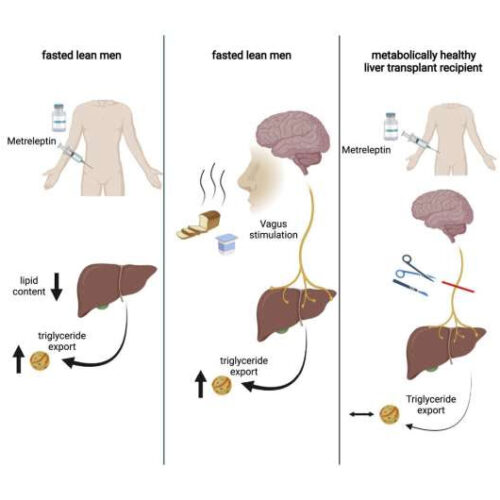by University of Jyväskylä Differences in V̇O2peak among children with different numbers of cardiometabolic risk factors. The metabolic syndrome was defined using the modified National Cholesterol Education Program definition and using the population specific highest 25th percentiles of waist circumference, HDL cholesterol (lowest 25th percentile), triglycerides, glucose, and blood pressure to define cut-offs for an increased...
Category: <span>Metabolic</span>
α-Ketoglutarate (AKG) as a nutritional supplement to enhance health and exercise performance
HIGHER EDUCATION PRESS IMAGE: THE VASCULAR SMOOTH MUSCLE AKG/OXGR1 SIGNALING PATHWAY REGULATES SKELETAL MUSCLE VASODILATION, FIBER TYPE, AND METABOLISM CREDIT: JINPING YANG, GULI XU, YIMING XU, PEI LUO, YEXIAN YUAN, LIN YAO, JINGJING ZHOU, YUNLONG ZHU, ISHWARI GYAWALI, CHANG XU, JINLONG FENG, ZEWEI MA, YUXIAN ZENG, SONGBO WANG, PING GAO, CANJUN ZHU, QINGYAN JIANG, GANG...
Increased thermogenesis in fat cells during active period of circadian rhythm limits weight gain in mice
by Bob Yirka, Medical Xpress Credit: Pixabay/CC0 Public Domain A team of researchers at Northwestern University, working with a pair of colleagues from the University of Texas, has found that an increase in thermogenesis in fat cells during active periods of the daily circadian rhythm can limit weight gain in mice. Their paper is published...
Adjusting diet can help women through menopause
by King’s College London Credit: Unsplash/CC0 Public Domain Altering diet can reduce unfavorable health changes associated with menopause such as blood sugar control and cholesterol levels. The research, published in eBioMedicine, is from PREDICT which is the largest study of its kind and explores menopause affects day-to-day metabolism. The study involved scientists from King’s, the personalized nutrition company ZOE,...
Are midlife women doomed to gain weight?
by The North American Menopause Society Credit: Pixabay/CC0 Public Domain Weight gain is a common complaint of midlife women, with more than two-thirds of midlife US women being over the ideal weight threshold. Aging-related metabolic changes promote weight gain in both sexes, but women face additional challenges because of menopause. A presentation at The North...
Hormone therapy may help prevent shoulder pain and loss of motion in menopausal women
by The North American Menopause Society Credit: Unsplash/CC0 Public Domain Women aged 40 to 60 years are most affected by adhesive capsulitis, a painful orthopedic disorder characterized by sudden shoulder pain and loss of range of motion. There has been limited research around the disorder’s predilection for perimenopausal women, but a new study found that...
Hormone protects against development of fatty liver
by Medical University of Vienna Graphical abstract. Credit: Cell Metabolism (2022). DOI: 10.1016/j.cmet.2022.09.020 A group at MedUni Vienna has identified a regulatory loop controlled by leptin, by which this adipocyte-derived hormone regulates hepatic lipid metabolism via the autonomic nervous system. The study, published in Cell Metabolism, provides evidence that this adipose tissue-brain-liver axis, previously identified in animal models,...
How genetics influences our body weight beyond genes
by Fabio Bergamin, ETH Zurich The role of miR-7 in Sim1 neurons to regulate mammalian energy homeostasis and neuroendocrine function. In mice, hypothalamic expression of miR-7 is regulated by metabolic state. In humans, variants in the locus encompassing miR-7 are associated with reduced expression of HNRNPK/MIR-7-1. miR-7 regulates the expression of the noncoding RNAs Cyrano...
Researcher discovers a muscle that can promote glucose and fat burning to fuel metabolism for hours while sitting
by Laurie Fickman, University of Houston Marc Hamilton, professor of Health and Human Performance at the University of Houston, is pioneering the “soleus pushup” for the calf muscle that is only 1% of your body weight, but can improve the metabolic health in the rest of your body if activated correctly. Credit: University of Houston...
‘Night owls’ could have greater risk of type 2 diabetes and heart disease than those who are ‘early birds’
by The Physiological Society Credit: CC0 Public Domain Are you an early bird or a night owl? Our activity patterns and sleep cycles could influence our risk of diseases, such as type 2 diabetes and heart disease. New research published in Experimental Physiology has found that wake/sleep cycles cause metabolic differences and alter our body’s preference for...










